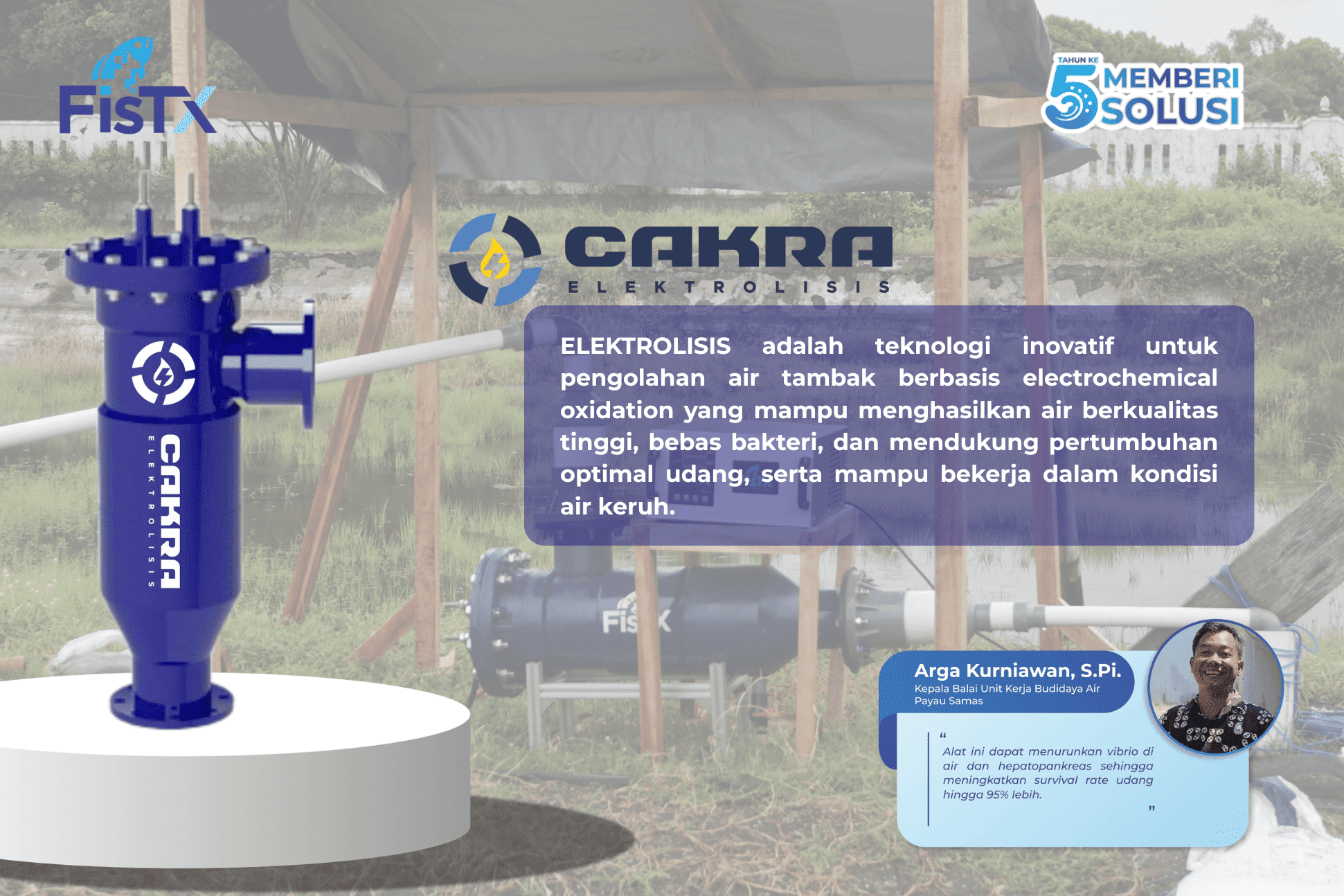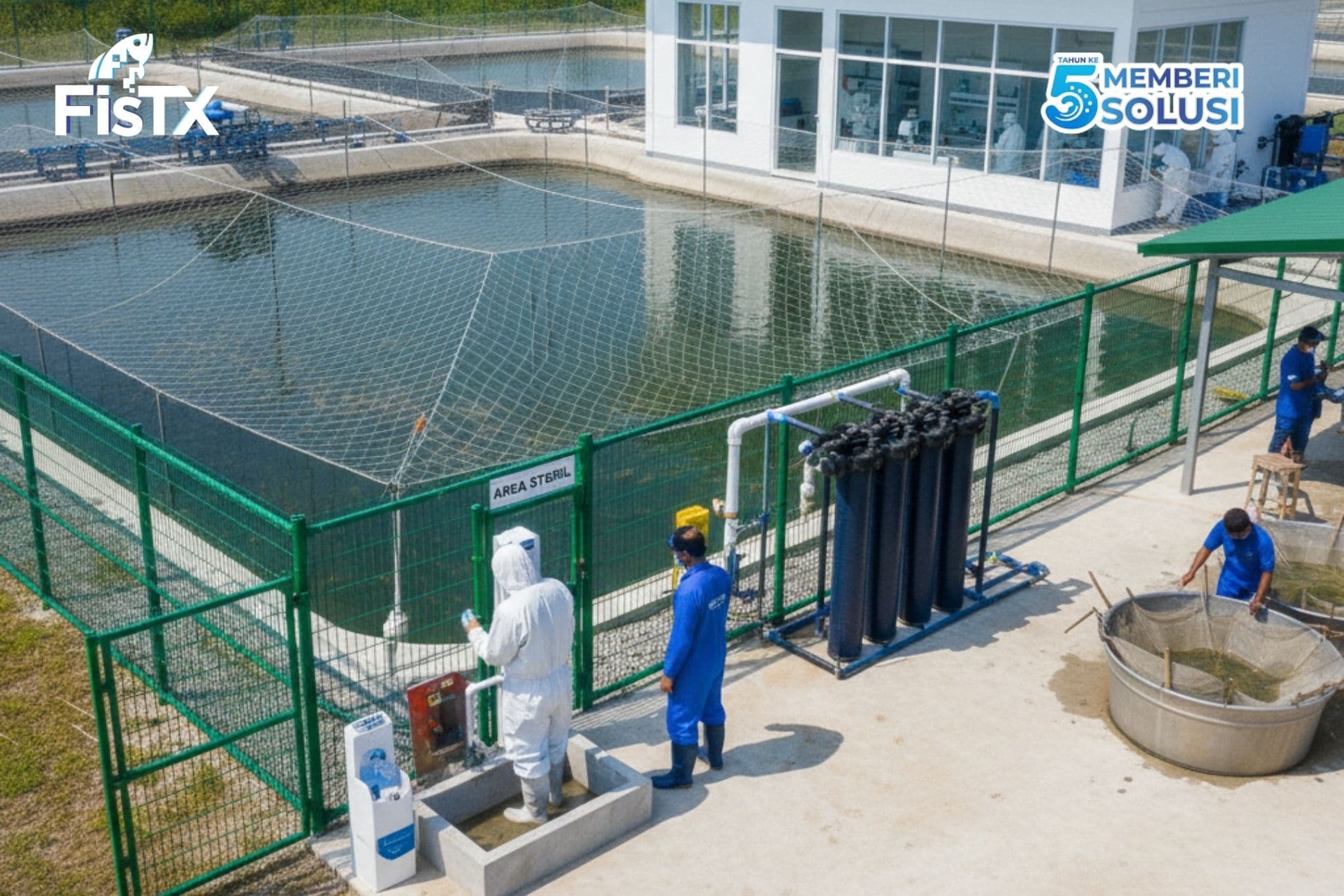
FisTx Launches Cakra Electrolysis: Electrochemical Technology to Improve Water Quality and Shrimp Farm Productivity in Indonesia
Collaboration with UK BAP Samas proves a 95%+ increase in survival rate in one cultivation cycle
FisTx officially introduces Cakra Electrolisis, an electrochemical water sterilisation technology designed to improve biosecurity, water quality stability, and national shrimp farming productivity. This launch is reinforced by the full implementation of one cultivation cycle at the Brackish Water Cultivation Unit (UK BAP Samas) in Yogyakarta, which has resulted in significant improvements in reducing pathogenic bacteria and increasing survival rates.
What is Cakra Electrolisis? Electrochemical Technology for Modern Ponds
Cakra Electrolisis is an innovative water treatment technology that utilises electric current to break down chloride ions (Cl⁻) into hypochlorous acid (HOCl) and other active oxidants. HOCl is a natural disinfectant that effectively suppresses pathogenic bacteria such as Vibrio, yet is safe for shrimp and leaves no harmful residues.
This technology helps farmers reduce their dependence on chemicals such as chlorine and chlorine, while improving water quality stability during the maintenance period.

Results of Implementation at UK BAP Samas: Vibrio Decreases, Survival Rate Increases
Field tests of Cakra Elektrolisis showed excellent performance in controlling pathogens and improving water quality parameters.
According to Arga Kurniawan, S.Pi, Head of UK BAP Samas:
‘This device is capable of reducing Vibrio in both water and hepatopancreas, thereby increasing the survival rate of shrimp to over 95%.’
In addition to suppressing Vibrio, the increase in ORP (Oxidation Reduction Potential) and the reduction in ammonia also help create a more stable and healthy cultivation environment.
Solutions to Indonesia's Shrimp Farm Biosecurity Challenges
FisTx CEO Rico W. Wibisono emphasised that this technology was designed as a solution to the major challenges of modern shrimp farming, particularly those related to pathogen control and chemical residue risks.
“We want pond water to not only be clean but also actively protective. Cakra Electrolisis is an innovation that allows farmers to maintain biosecurity without relying on chemicals,” said Rico.
Cakra Electrolisis not only improves water quality but also supports more efficient, sustainable, and environmentally friendly farming.
Supported by National Aquaculture Experts
The push to switch to physical-based water sterilisation technologies such as UV and electrolysis also comes from national aquaculture expert Dr Hasanuddin Atjo, who stated:
“Raw water treatment technology for aquaculture must be taken seriously. Innovations to create affordable domestic water sterilisation infrastructure—such as UV and electrolysis technologies—need to be continuously promoted so that the industry no longer relies on chemicals.”
This statement reinforces the relevance of Cakra Electrolysis to the current needs of the national aquaculture industry.
Test Results: Effective, Efficient, and Measurable
The following is a summary of the results of a single cultivation cycle using Cakra Electrolysis at UK BAP Samas:

This data confirms that electrolysis is not only effective but also economical for both intensive and semi-intensive cultivation systems.
As a follow-up step, FisTx is offering farmers, practitioners, and industry players the opportunity to consult directly about their farm's biosecurity needs and receive a demonstration of Cakra Elektrolisis technology. The FisTx technical team is ready to help design the most suitable solution for each farm's conditions, including needs analysis, efficiency calculations, and operational simulations. For further information, please contact 0823-2354-5511.


